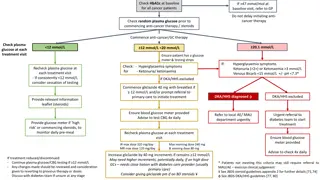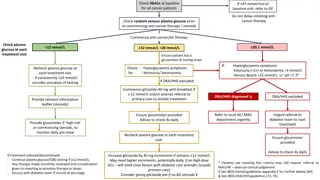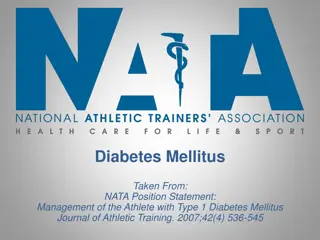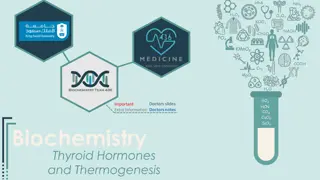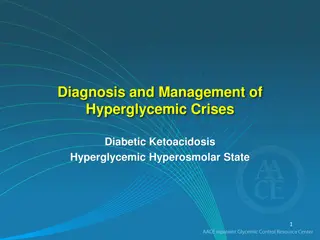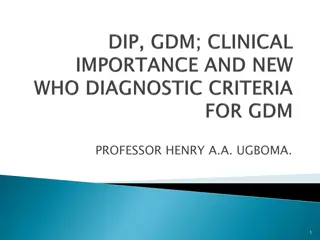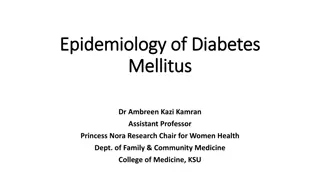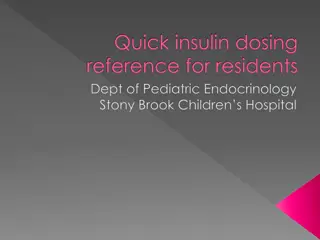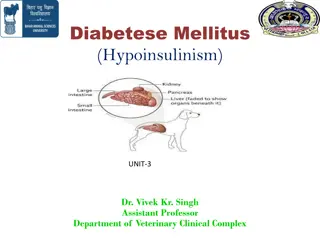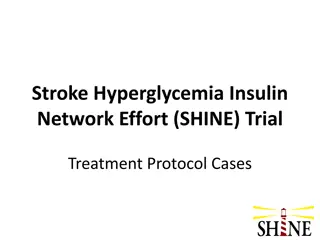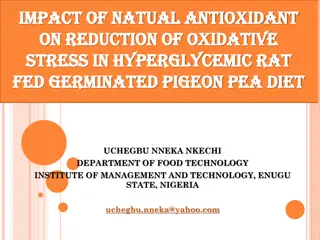Simulation-Based Training for Diabetes Care in Nursing
This simulation program, SCENS, focuses on enhancing nursing skills in managing diabetes-related complications such as hyper/hypoglycemia. The learning objectives include assessment, safe care provision, insulin administration, and effective communication. The simulation addresses the significant im
0 views • 17 slides
Guidelines for Monitoring Blood Glucose in Cancer Patients Undergoing Anti-Cancer Therapy
Guidelines recommend checking HbA1c and random plasma glucose levels at baseline for all cancer patients before initiating anti-cancer therapy. Regular monitoring of plasma glucose levels during treatment is essential, with specific actions based on glucose readings. Immediate referrals and treatmen
0 views • 4 slides
Guidelines for Managing Hyperglycemia in Cancer Patients Receiving Anti-Cancer Therapy
Cancer patients undergoing anti-cancer therapy need vigilant monitoring for hyperglycemia. Baseline HbA1c and random plasma glucose levels must be checked before initiating therapy. Regular glucose monitoring, symptom assessment, and ketone testing are crucial throughout treatment. Prompt referrals,
0 views • 4 slides
Diabetes Mellitus Type 1 Management Guidelines for Athletes
Diabetes Mellitus Type 1 is a chronic endocrine disorder characterized by hyperglycemia, absolute insulin deficiency, and autoimmune origins. This condition, more common among athletes, requires careful monitoring, insulin therapy, blood glucose management during exercise, and recognition of hypogly
0 views • 7 slides
Understanding Glucose Homeostasis in Metabolic Processes
Glucose homeostasis is crucial for controlling glucose metabolism and maintaining normal blood glucose levels in the body. It involves various metabolic sources, including dietary intake and gluconeogenesis. The liver plays a vital role in regulating blood glucose levels, while severe hypo- and hype
0 views • 17 slides
Acute Diabetic Ketoacidosis in a 19-Year-Old Male
Acute presentation of a 19-year-old man with diabetic ketoacidosis (DKA) characterized by hyperglycemia, anion-gap acidosis, and ketosis. Clinical findings include dehydration, hyponatremia, hypotension, altered consciousness, and abdominal pain. Immediate management involves ABCs, fluid resuscitati
0 views • 16 slides
Understanding and Managing Hyperglycemic Crises: DKA and HHS
Hyperglycemic crises such as Diabetic Ketoacidosis (DKA) and Hyperglycemic Hyperosmolar State (HHS) are life-threatening emergencies characterized by severe hyperglycemia and metabolic imbalances. DKA involves absolute or near-absolute insulin deficiency leading to ketone body production and systemi
0 views • 82 slides
Understanding Gestational Diabetes Mellitus
Gestational Diabetes Mellitus (GDM) is a condition of glucose intolerance in pregnancy, characterized by hyperglycemia. It poses risks to both mother and baby, including macrosomia, birth trauma, neonatal complications, and long-term complications. The diagnosis of GDM involves criteria set by WHO i
0 views • 15 slides
Overview of Diabetes Mellitus: Types, Diagnosis, and Epidemiology
Diabetes Mellitus is a metabolic disorder characterized by chronic hyperglycemia. It includes Type 1, Type 2, Gestational, Secondary, and Pre-diabetes. Diagnosis involves symptoms like thirst, frequent urination, and weight loss, along with specific glucose tests. Understanding the types, diagnostic
0 views • 30 slides
Pediatric Endocrinology Insulin Dosing Guide
Comprehensive reference for insulin dosing in pediatric endocrinology, covering onset, peak, and duration of action of various insulin preparations, guidelines for twice-daily dosing, managing Dawn Phenomenon and rebound hyperglycemia, and tips for multiple daily injections. Includes information on
0 views • 13 slides
Understanding Diabetes Mellitus in Dogs: Causes, Symptoms, and Treatment
Diabetes mellitus is a common endocrine disorder in dogs, characterized by symptoms like polyuria, polyphagia, and cataract development. The etiology involves insulin deficiency and insulin resistance, leading to hyperglycemia and various clinical manifestations. Diagnosis is based on symptoms, glyc
0 views • 9 slides
Stroke Hyperglycemia Insulin Network Effort (SHINE) Trial - Case #1 Control Group Protocol
The SHINE trial involves treatment protocols for hyperglycemia in stroke patients. In case #1, a patient is enrolled in the control group with specific timing requirements for checks, dosing, and insulin administration. Understanding the hourly and Q3 hourly check schedules is crucial for proper pat
0 views • 26 slides
Impact of Natural Antioxidant on Reducing Oxidative Stress in Hyperglycemic Rats Fed Germinated Pigeon Pea Diet
Diabetes, a metabolic disorder characterized by hyperglycemia, affects millions worldwide. Oxidative stress plays a key role in its pathogenesis, leading to decreased antioxidant capacity. This study explores the potential of natural antioxidants from germinated pigeon pea to reduce oxidative stress
0 views • 19 slides

